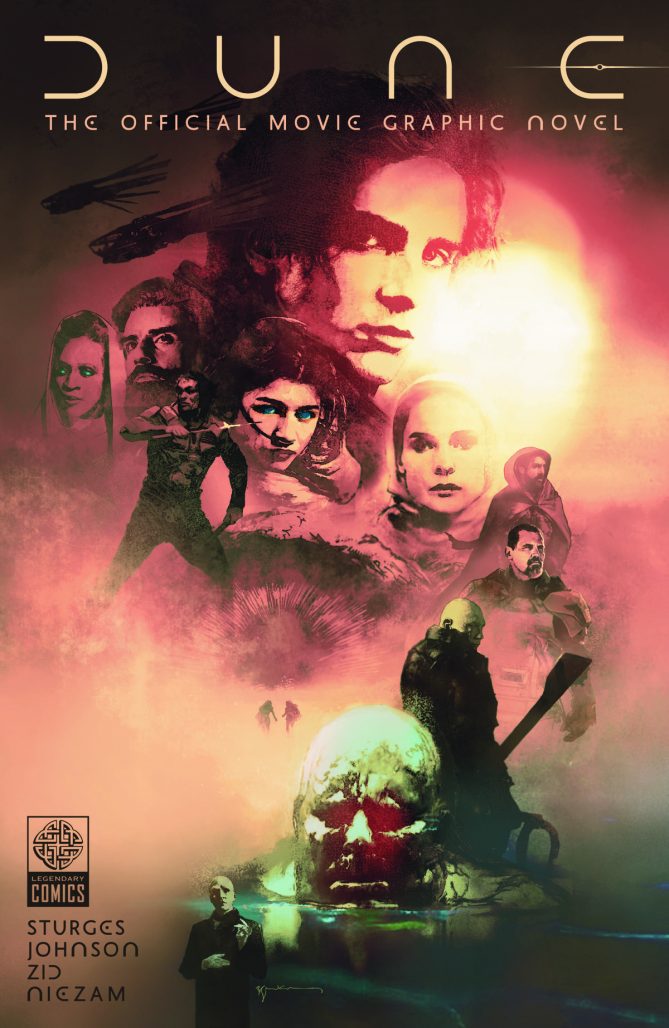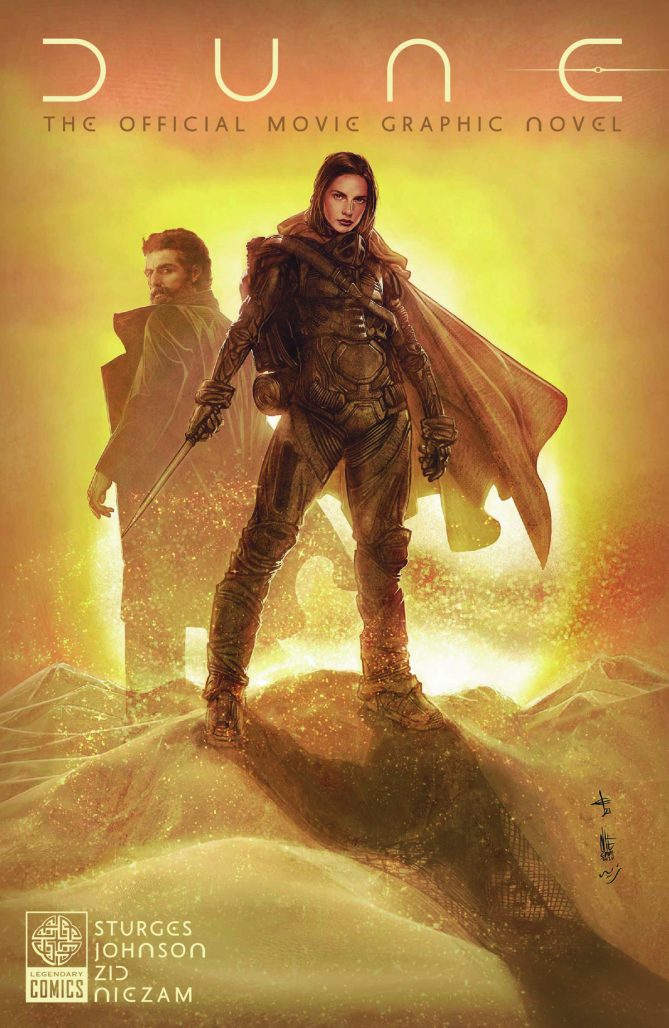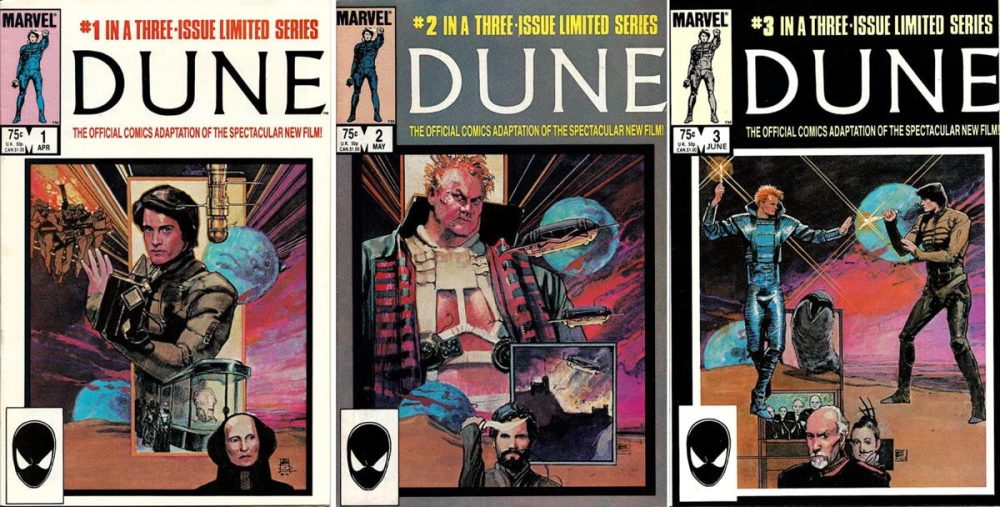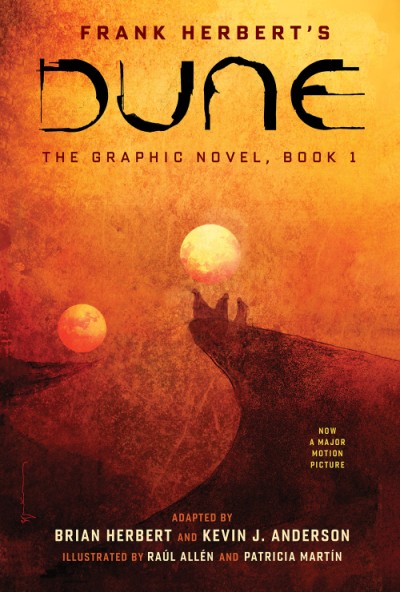 The Dune motion picture has been a hit and spawned a pretty lively online fanbase after less than a week in theaters and HBO Max - and Part Two has already been announced, breaking the David Lynch/Ralph Bakshi curse.
The Dune motion picture has been a hit and spawned a pretty lively online fanbase after less than a week in theaters and HBO Max - and Part Two has already been announced, breaking the David Lynch/Ralph Bakshi curse.
The film is produced by Legendary Pictures, which also has a comic book division, and as is customary with Legendary films, a graphic novel adaptation has also been announced, written by Lilah Sturges with art by Drew Johnson and colorist Zid, and various spectacular covers by Bill Sienkiewicz, Johnson, Zid, John Ridgeway, Tim Sale and more.
So far so good, all seems normal. But what really surprised people about this book was the method of distribution: not via comics shops, but as a Kickstarter campaign. Surely Legendary has the money to make Dune Part Two the motion picture - and Part One has already grossed $40 million in theaters, so you'd think that they'd have the money to make a regular old comic book. Online reactions were spicy, to say the least.
I was a bit skeptical myself but then I saw Legendary had partnered with Rocketship Entertainment for this campaign. Since I consider both Legendary Comics SVP Robert Napton and Rocketship CEO and Publisher Tom Akel two of the smarter comics publishing execs around, I figured they had their reasons, and reached out for some clarification. And they answered.

Looking at the campaign I noticed the book comes with a variety of extras and tchotkes likes pins, and various covers. Other crowdfunding platforms - Indiegogo and new comer Zoop - have become a bit of a "shopping cart" for crowdfunding campaigns. I wondered if this was an accurate way to look at the Dune campaign.
Party, said Akel. "Some companies certainly use Kickstarter in a pre-order capacity. Though even in that model the real idea here is to be able to give back to the fans - everything from signed bookplates to exclusive covers to appearing in the books are offerings you just can't logistically handle any other way. A platform like Kickstarter enables us to offer content directly to fans that there is no other avenue for."
"That's exactly how I see it," Napton concurred. "Everything Legendary Comics brings to Kickstarter is getting produced as a book either way, but the exclusive items and covers get funded by backers and we are able to offer a more premium collector version to fans. To me Kickstarter is like an exhibit hall or dealer's room of a convention – it's a community who is interested in purchasing a more collectible version or exclusive item."
While giving out extras makes a lot of sense....why not just sell your Sandworm pins directly? you may be asking yourself. It turns out....Kickstarting is selling directly. Akel points out that even Lego and Hasbro have built their own crowdfunding platforms to sell merch directly to fans - and crowdfunding platforms gives the fans direct input into what is made. "What do the fans want or what do we want to offer that we can only do here?" Akel continued. "We see comments and will sometimes change an offering, or offer an additional product that we can now make in limited supply. It certainly mitigates risk but it also allows fans to influence the production. And I think the fans would agree that often their voices aren't heard. Here, they're heard loud and clear."
The graphic novel will eventually be sold through regular channels, according to Napton, so this channel is just for people who do want those extras. "Anyone who solely wants the graphic novel can buy a copy anywhere books are sold, but for the fans who want the book plus other exclusive items, it's a fun space to play in. I have backed books that I am personally interested in, as well as gotten art prints and things that I might not have gotten elsewhere or have seen together all in one place."
Love it or hate it, these kinds of "corporate Kickstarters" seem to be here to stay, with the spectacular success of the Boom BRZRKR campaign serving as inspiration. While Rocketship is mostly known for bringing webcomics to print, Akel hopes that this other model is also around for good. "I'm a firm believer in a rising tide lifts all boats. I see concerns that smaller indie projects will get drowned out on Kickstarter because of bigger name projects and now that this has been going on for some time we know that's not the case. The more new backers coming to Kickstarter for something they're familiar with - be it Dune, Keanu Reeves, Power Rangers, books from Skybound, Top Cow, Dynamite, and so on, or even the Marvel and DC fans who are getting all their table top games on Kickstarter, all help build discovery of new projects from new creators.
"Rocketship runs a lot of campaigns for books that are not as well known as those," he continued "and the more folks on there looking for the next comic to read after they've gotten the one they're familiar with, the better it is for everyone. Every backer of BRZRKR by now has gotten several updates and newsletters promoting all kinds of new books they would not have known of otherwise."
Napton sees this as part of the spread to multiple sales channels that all comics publishers contemplated after the pandemic disruptions of 2020, as "many companies used direct to consumer platforms like Kickstarter to position publications or collections. I think campaigns are simply another channel for pre-sales and funding exclusive items. On demand to consumer is a model that helps publishers but also more importantly gives collectors and fans access to exclusive items and opportunities to further interact with the stories and creators."
The plan is for the mass market edition and the collector's edition to go on sale at the same time so "[they] can easily co-exist," he says.
While I don't expect the controversy over these "corporate Kickstarters" to end, Akel and Napton do have a point: why shouldn't comics publishers cut out the middle men and sell direct to fans if everyone walks away happy? Kickstarter has long since evolved from a resource for people who couldn't fund projects any other way to a way to make money for extremely popular projects.
At any rate, it's yet another evolution of both crowdfunding and comics publishing. And it's a far cry from the many OTHER Graphic novel adaptations of Dune!

As noted in the campaign, in 1984 Sienkiewicz himself drew a spectacular adaptation of the David Lynch version of the tale, adapted by Ralph Macchio. An oral history of that version was just published on TCJ.com.

And currently there is yet another graphic novel adaptation of Frank Herbert's classic adapted by his son Brian Herbert and Kevin J. Anderson, with art by Raúl Allén and Patricia Martín. And just to add to the merriment, this version ALSO has a cover by Sienkiewicz.
If there's one thing all of this proves it's that consumers and fans have lots of choices for what to spend their money on - and that the Dune adaptations must flow.

 The Dune motion picture has been a hit and spawned a pretty lively online fanbase after less than a week in theaters and HBO Max - and Part Two has already been announced, breaking the David Lynch/Ralph Bakshi curse.
The Dune motion picture has been a hit and spawned a pretty lively online fanbase after less than a week in theaters and HBO Max - and Part Two has already been announced, breaking the David Lynch/Ralph Bakshi curse.


No comments:
Post a Comment